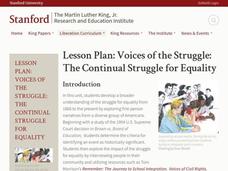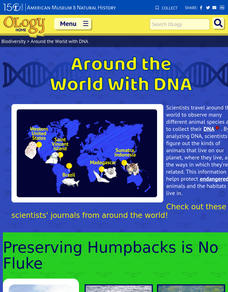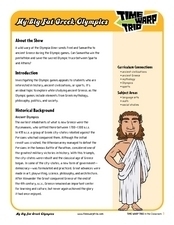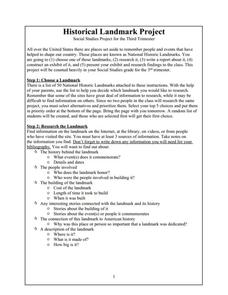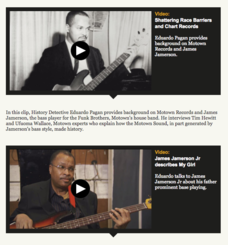US Holocaust Museum
Defying Genocide
Defying death. Defying those who want to do harm. Defying genocide. Pupils research the events in Rwanda to gain an understanding of what it takes to survive a horrific event like a holocaust. They use video, time lines, and Holocaust...
Maryland Department of Education
The Concept of Diversity in World Literature Lesson 7: Cultural Commentary
As part of their study of Things Fall Apart, class groups develop a multimedia presentation in response to the question, "In what ways does Achebe use literature as a means to express and comment on culture and history?"
Stanford University
Voices of the Struggle: The Continual Struggle for Equality
As part of a study of the Civil Rights Movement from 1868 to the present, class members examine first person narratives, the Supreme Court case Brown v. Board of Education, and other significant events in civil rights history. They then...
Alabama Department of Archives and History
A College Student's Perspective on WWI
Some things remain the same, such as the world being on the brink of war, or college attendees writing home requesting money. As part of their research into events that led up to President Wilson's declaration of war on Germany, class...
Core Knowledge Foundation
Genetics and the Master Race
How did the beginnings of genetic research influence the Nazi party? A thorough, engaging unit incorporates the work of Gregor Mendel, the study of inherited traits, and the use of racism and discrimination during the Holocaust.
Smithsonian Institution
Latino Expression
How much of your daily life is influenced by Latin American music? Take a listen—the answer may surprise you! High schoolers keep a journal to note any instances they see Latino culture represented, including the media, their school, and...
American Museum of Natural History
Around with World with DNA
A mammalogist, ornithologist, ichthyologist, and a conservation geneticist share their work and their hopes that their research will help protect and save endangered species and their habitats.
Time Warp Trio
My Big Fat Greek Olympics
The Olympic Games are indeed a significant and far-reaching cultural component in our international community today, but from where do they originate? Where do our traditions stem from, and how do we choose the sports that constitute...
Azusa Pacific University
Historical Landmark Project
Close a unit or the year with a five-step research project. Class members choose a US landmark, research the landmark, compose a report about it, build a model of it, and present their model and findings to the class. Each step is...
James Madison Memorial Fellowship Foundation
Those "Other Rights:" The Constitution and Slavery
Did the United States Constitution uphold the institution of slavery, or did it help to destroy it? Young historians study Article 4, Section 2, Clause 3 of the Constitution and evaluate the rights of slaveowners as they compared to or...
PBS
The Sixties: Hitsville USA
James Jamerson. You probably heard him but may not have heard of him. But fans of Motown Records will certainly recognize his contributions to the sound that desegregated popular music during the 1960s. Challenge young history detectives...
Stanford University
Letter from Birmingham Jail: The Power of Nonviolent Direct Action
What strategies are most effective in changing an unjust law? Class members examine the tactics used in the Birmingham Campaign of 1963 (Project C) to achieve social justice and social transformation. After examining documents that...
National Endowment for the Humanities
The "To Do List" of the Continental Congress
What is on your to-do list today? The second lesson of a three-part series on Lost Heroes of America investigates the laundry list of items in front of the second Continental Congress. Scholars research, analyze, and present information...
Curated OER
What Kind of Vessel Are You?
This is a strange question; but what kind of vessel would you be and why? After examining images of a large Inca jug, the class sets to writing a creative narrative that answers that very interesting question. They start by researching...
McGraw Hill
Arthropods
Are spiders related to crabs? Study the order of arthropods with a reading selection about animal diversity. It provides details about each class within the order, as well as vivid pictures and explanatory charts.
Population Connection
The Human-Made Landscape
Agriculture, deforestation, and urbanization. How have human's changed the planet and how might we mitigate the effects of human activity on the planet? To answer these questions class members research the changes in human land use from...
Macmillan Education
Webquest: Thanksgiving
Class members use the Internet to research the history of Thanksgiving in the United States and Canada, as well as the traditions surrounding the Thanksgiving-style celebrations of the Hebrews, the Chinese, and in Ancient Greece and Rome.
Constitutional Rights Foundation
Guest-Worker Program
The U.S. Guest-Worker Program and the H-2A visa are the focus of a social studies activity. First, class members assume the role of advisors who must present the president with four proposals that would amend the visas given to...
Minnesota Literacy Council
Introduction to Historical Thinking
Christopher Columbus: hero or villain? Prepare class members for the debate with activities that asks them to think critically about how history is reported.
Curated OER
The Great Depression and New Deal
Elementary pupils are introduced to the Great Depression as a critical period of hardship in United States history. They engage in collaborative assignments researching the Dust Bowl, the New Deal, US presidents, and presidential libraries.
Museum of Modern Art
Modern Art and Ideas
The Museum of Modern Art provides this educators' guide to Dada and Surrealism. Featuring the works of such artists as Jean Arp, Salvador Dali, Joan Miro, and Meret Oppenheim among others, the guide is ideal for art history and...
Advocates for Human Rights
Who are Immigrants?
What do Jerry Yang, Patrick Ewing, John Muir, Charlize Theron, Peter Jennings, and Saint Frances X Cabrini all have in common? They are all immigrants to the United States. Famous and not-so-famous immigrants are the focus of a resource...
Theodore Roosevelt Association
Roosevelt's Legacy: Conservation
The legacy of Theodore Roosevelt carries through modern American politics, economics, foreign policy, and society. But his proudest and most profound efforts were in the world of conservation, and in preserving the natural beauty of...
National History Day
Challenging the Status Quo: Women in the World War I Military
Why are some so resistant to change? The status quo is often to blame for a lack of forward movement in society. Following the events of World War I, women in America suddenly had a voice—and were going to use it. Scholars use the second...




